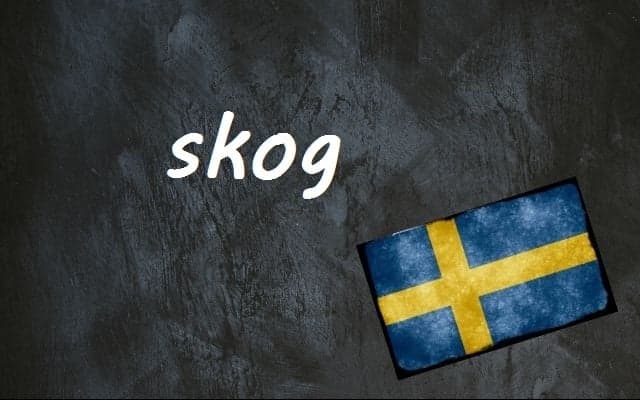Swedish word of the day: skog

Here's a word that means a lot to Sweden and the Swedes.
Skog means 'forest', but in Sweden it's so much more. Hear how to pronounce the word in the clip below:
Skog is an en word, so 'the forest' is skogen.
More than half of Sweden – an area equal to the size of the United Kingdom – is covered in forest. This area is growing thanks to protective policies that mean the growth rate outpaces the felling rate. And these forests provide around ten percent of Swedish employment and exports; everything from furniture to toilet paper.
Most Swedish forests are owned either privately or by companies, but the Swedish Constitution grants everyone the so-called right to roam, meaning everyone can hike, camp, and pick berries in nature. And they do. Spending time in the forest is a bit part of the Swedish lifestyle, whether holidaying in a remote stuga or on a day out hunting for mushrooms.
The old Swedish word skogher is the root of today's skog; initially it meant 'something that protrudes' -- think of those awe-inspiring trees stretching upwards. The word skog has been used since the 16th century, and today it pops up in several common phrases.
The most common is dra åt skogen!, literally 'go to the forest!' but used as a slightly politer version of 'go to hell!'
When a project 'goes to the forest' (att gå åt skogen) it means it's gone a bit wrong. And you can say someone or something is skogstokig (literally 'forest crazy') meaning 'totally crazy'.
Examples
Jag tog en lugn skogspromenad
I went for a calm walk in the forest
Här är bara skog överallt
Around here there's nothing but forest
Comments
See Also
Skog means 'forest', but in Sweden it's so much more. Hear how to pronounce the word in the clip below:
Most Swedish forests are owned either privately or by companies, but the Swedish Constitution grants everyone the so-called right to roam, meaning everyone can hike, camp, and pick berries in nature. And they do. Spending time in the forest is a bit part of the Swedish lifestyle, whether holidaying in a remote stuga or on a day out hunting for mushrooms.
The old Swedish word skogher is the root of today's skog; initially it meant 'something that protrudes' -- think of those awe-inspiring trees stretching upwards. The word skog has been used since the 16th century, and today it pops up in several common phrases.
The most common is dra åt skogen!, literally 'go to the forest!' but used as a slightly politer version of 'go to hell!'
When a project 'goes to the forest' (att gå åt skogen) it means it's gone a bit wrong. And you can say someone or something is skogstokig (literally 'forest crazy') meaning 'totally crazy'.
Examples
Jag tog en lugn skogspromenad
I went for a calm walk in the forest
Här är bara skog överallt
Around here there's nothing but forest
Join the conversation in our comments section below. Share your own views and experience and if you have a question or suggestion for our journalists then email us at [email protected].
Please keep comments civil, constructive and on topic – and make sure to read our terms of use before getting involved.
Please log in here to leave a comment.